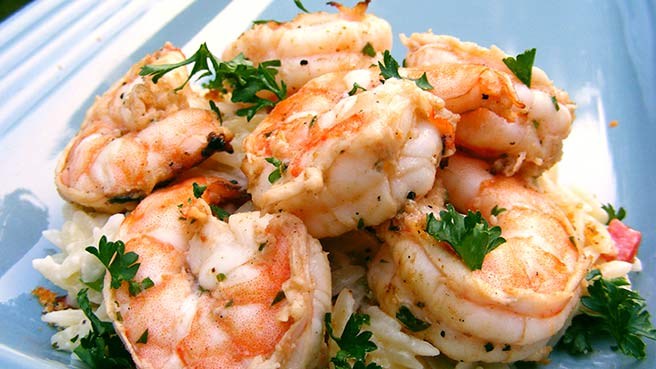4 Things You Should Know About Shrimp

Shrimp cocktail is on practically every menu. If you’re a seafood eater and you enjoy these crustaceans, either chilled or in hot dishes, here are a few things you should know.
They’re low in calories
One medium shrimp provides about 7 calories, which means a dozen add up to less than 85 calories—roughly 15 less than a 3-ounce chicken breast (about the size of a deck of cards in thickness and width). One jumbo shrimp, the type often served in shrimp cocktail, contains about 14 calories, and a teaspoon of cocktail sauce provides 5, so three jumbo shrimp, each with a teaspoon of cocktail sauce as an appetizer, adds up to less than 60 calories, about 10 less than just one pig in a blanket, and 20 less than two mini empanadas or two mini quiche.
They’re protein-rich
In addition to their water content, shrimp are primarily made of protein. Three ounces of baked or broiled shrimp provides about 20 grams of protein, just a few grams less than that a 3-ounce chicken breast. Each jumbo shrimp provides about 3 grams, and contains very little fat and carbohydrate.
They provide key nutrients
Aside from protein, shrimp provide a pretty impressive array of nutrients. Four ounces steamed contains over 100% of the Daily Value for selenium, over 75% for vitamin B12, over 50% for phosphorous, and over 30% for choline, copper, and iodine. And while we don’t typically think of animal proteins as sources of antioxidants, shrimp contain two types. In addition to being a mineral that plays a role in immunity and thyroid function, selenium is an important antioxidant that helps fight damaging particles called free radicals, which damage cell membranes and DNA, leading to premature aging and disease. Another antioxidant, called astaxanthin, which provides the primary color pigment in shrimp, has been shown to help reduce inflammation, a known trigger of aging and disease.
They’re a common allergen
As a member of the shellfish family, shrimp are among the top allergens, which in addition to shellfish include milk, eggs, fish, tree nuts, peanuts, wheat, and soy. Exposure to shrimp by those who are allergic to shellfish can cause a severe reaction, including life threatening anaphalyaxis. More mild reactions may include a stuffy nose, sneezing, itchy skin, hives, tingling in the mouth, abdominal pain, and nausea. A food allergy can develop at any age. If you think you may be allergic to shrimp, or any other food, see an allergist for testing right away.
